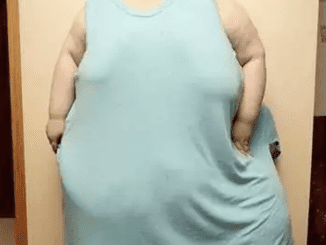
In a society increasingly driven by appearance and online validation, the story of Valeria Levitin serves as a powerful and emotional reminder of how fragile our relationship with body image can become. Once labeled by global media as the “world’s thinnest woman,” Valeria’s life is not just a reflection of personal struggle — it’s a wake-up call about the impact of societal pressure and the dangers of untreated eating disorders.
Valeria’s journey isn’t about vanity or fame. It’s about survival, awareness, and the high cost of chasing unrealistic beauty ideals.
A Struggle Rooted in Early Expectations
Valeria was born in 1973 and raised in a home where appearance mattered deeply. From a young age, she felt intense pressure to be thin — not just to look good, but to be accepted. Family expectations and cultural norms convinced her that smaller meant better, and thinner meant worthier. These beliefs planted the seeds for what would become a life-threatening struggle.
Video World’s Skinniest Woman (Update), Valeria Levitin, Anorexia, Diet, Eating Disorders
By the time she was a teenager, the obsession with weight control had taken over her thoughts. When she moved to the United States at age 16, hoping for a new beginning, she instead found herself more isolated than ever. In a desperate effort to fit in, she adopted strict, dangerous eating habits. What started as dieting quickly evolved into a full-blown eating disorder.
The Modeling Dream That Became a Nightmare
Like many young women, Valeria once dreamed of becoming a model. She believed the industry would offer her validation and success. But the reality was far harsher. Instead of being welcomed for her dedication, she was repeatedly told she needed to lose more weight — despite already being underweight.
By her early 20s, the situation had worsened. Doctors began warning her of serious, long-term consequences. She was banned from dancing due to the high risk of bone fractures. Her body was weakening rapidly, and by age 24, she had lost not just weight — but her sense of self.

Life at a Dangerous Weight
At her lowest point, Valeria weighed less than 60 pounds. She described feeling disconnected from the world — both physically and emotionally. Simple pleasures, such as enjoying a meal or walking comfortably, became distant memories.
Video Body Bizarre | The World’s Thinnest Woman
Despite her health crisis, her appearance began to attract attention online. Tragically, some young women reached out to her, asking how they could look the same. Valeria’s response was both heartbreaking and brave:
“I’m not here to teach young girls how to die.”
That single sentence reflects the gravity of her experience — and her refusal to glamorize a condition that has nearly cost her everything.
Finding Purpose in Advocacy
Rather than hiding, Valeria chose to speak out. She began sharing her story with the hope that it might prevent others from going down a similar path. Her advocacy focuses on self-acceptance, early intervention, and the importance of understanding eating disorders as serious medical conditions — not lifestyle choices.
Valeria also opened up about her personal dreams. One of her greatest wishes is to one day become a mother. That hope keeps her motivated to continue her recovery and work toward a healthier future.

Why Her Story Matters Now More Than Ever
In today’s digital world, young people are exposed to carefully curated images and filtered versions of reality. The constant comparison to online “perfection” has led to an alarming rise in body dissatisfaction and disordered eating among teens and young adults.
Valeria’s story is a counterpoint to that illusion. It humanizes the toll of living under impossible standards and underscores the need for compassion, education, and honest conversation around mental health.
Her courage to share her journey isn’t just about her own healing — it’s a message to parents, teachers, healthcare providers, and anyone who loves someone struggling with body image: pay attention. Speak up. Offer support.
Final Thoughts
Valeria Levitin’s journey is not over. While she continues to face challenges, her voice has already made a difference. She reminds us that true beauty lies not in how much we weigh, but in our resilience, our authenticity, and our ability to rise — even when the world tells us we’re not enough.
If you or someone you know is struggling with an eating disorder, help is available. Recovery is possible — and you are never alone.


